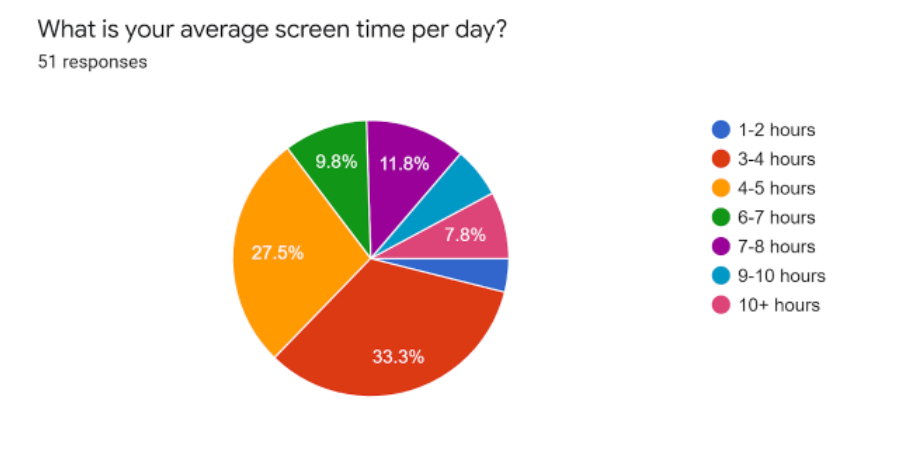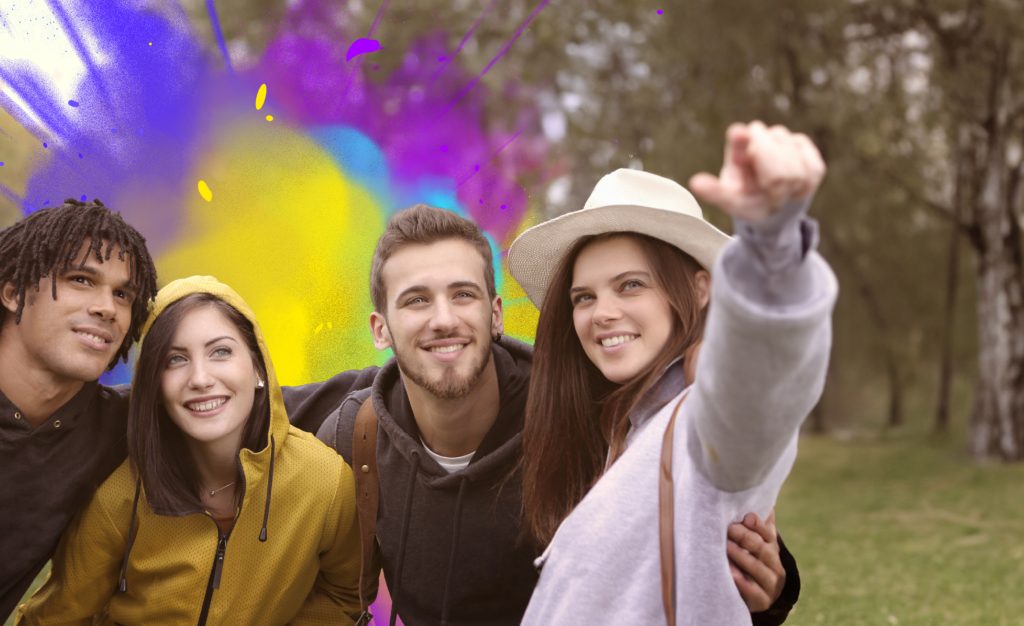

Effects of Social Media Algorithms on Screen Time
Research question: Are students aware of the effects of social media algorithms on screen time?
Purpose of article: To give insight into a regular school’s community’s level of awareness with screen time.
I. Introduction:
- Have you ever felt like you lost track of time while on social media? Have you ever felt as if you were just mindlessly scrolling and 5 minutes suddenly turns into 30 minutes spent on your phone? There are several reasons as to why we lose awareness on social media, and this is a purposeful design technique. The goal of these platforms are to increase your engagement without ever triggering your awareness. One of the primary ways to decrease your time on social media is to allow yourself to become consciously aware of your screen time and the algorithms in place. We are going to explore some of the main hidden tactics used to keep you trapped in mindless scrolling.
- The “like” effect- The “like” effect is one of the most effective tactics to keep you engaged on social media. When we get flooded with likes, comments, and notifications it makes us feel good about ourselves. This allows a chemical called dopamine (the happy chemical) to be released leaving you wanting more. Therefore, you keep going back to social media to try and find ways to fulfill that dopamine rush again. Although it may make you feel happy in the moment, it can actually make you feel more upset because you are constantly searching for ways to regain that happy feeling. And when your expectations are not fulfilled, you may question yourself and your identity leading to poor mental health.
- The “pull to refresh” tactic- When you are on social media, it is easy to instantly refresh your feed giving you different information and pictures to look at. When we constantly have this option to continuously give us more information, we are constantly tempted to use this because we are never satisfied with the information we are given. In fact, we aren’t even aware of our attention being stolen by these platforms because we are easily being given the option to have new information that is compelling and interesting and this can happen quickly, which is something we enjoy because of the efficiency. Pulling to refresh your feed happens subconsciously and in order to stop this, we have to become aware of how we are interacting with these platforms.
- Notifications- Multiple social media platforms notify users when there has been some sort of activity occurring. When this happens, notifications are sent to users, so that the user will check their phone because we have this deep desire to know and be constantly updated- especially when it revolves around ourselves. Some of these notifications include “mentioned you in their story,” “tagged you in a post,” “sent you a post,” etc.
- Showing you what you WANT to see- It is important that social media users know that every action they take on social media is being closely monitored and recorded to create a more accurate model of your identity. Social media pays attention to which posts you like, how long you look at a post, what topics you search for, etc. Platforms do this to ensure that you are being shown things that you find interesting and compelling… therefore keeping you on the app for a longer period of time.
- Infinite posts- There are infinite posts on social media–meaning you will never reach the end. There is a constant display of data and information that we find very difficult to pull away from because we think to ourselves, “there’s always something more; there’s always something that we are missing.” This tactic is especially shown through TikTok, where people are being shown videos that they are interested in and these things are being displayed through the For You Page.
If an individual is educated on these tactics, they will become much more productive on social media, and improve their relationship with their phone by simply being aware of how much time they are spending and how they are being manipulated. Questions that users can ask themselves are “how can we improve our awareness?” and “how is social media affecting our thoughts and perceptions?” Tuning in to your inner thoughts and feelings while on and off social media will allow you gain a broader perspective on how to have a healthier relationship with your phone and how to use it in more productive ways to benefit yourself and others.
The following research provides results from adolescents aging from 14-18 and will hopefully educate people on how social media is affecting consciousness and how it is playing a role in our own thoughts, ideas, and identity. It will also give insight into how adolescents feel about their relationship with social media and measurements as to how often social media is being used by a generation that is mostly affected by it.
II. Survey
Students in high school were given a survey and asked a variety of questions relating to their screen time and relationship with their phone.
Student’s screen time:
The pie chart below shows the percentages of screen time for the students. The data shows that most students’ screen time is between 3-4 hours a day. Students with a screen time of 1-2 hours a day is the least common.

Is social media overwhelming?
- Approximately 12% of students find social media overwhelming
- Approximately 45% of students do not find social media overwhelming
- Approximately 39% of students sometimes
The most common apps used:
- 28%- Tik Tok
- 26%- YouTube
- 18%- Snapchat
- 14%- Instagram
- 6%- Netflix
Levels of satisfaction with current screen time:
- 55% of students are satisfied with current screen time
- 31% not satisfied with current screen time.
III. Picture Analysis
Different students are shown a picture of something they might see on social media. The only difference is the number of likes on the photo. 12 students were shown a picture with high likes and 12 different students were shown the same pictures with low likes. The purpose of this evaluation is to see how much the number of likes influence an individual’s perception of the photo. Does the number of likes they see have any correlation with how they would view themselves if they got that number of likes? How much do we conflate numbers/likes with value and worth?
Students were asked the following questions:
- Would you like this photo? Why or why not?
- How attractive do you think this individual is?
- How happy do you think this individual is on a scale from 1-10?
- Would you be friends with this individual?

Low likes

High likes
| High likes | |
| Would you like this photo? | 3/11 said yes |
| How attractive do you think this individual is? (Averaged) | 5.5 |
| How happy do you think this individual is? (Averaged) | 5.5 |
| Would you be friends with this individual? | Nobody said yes |
| Low likes | |
| Would you like this photo? | 4/11 said yes |
| How attractive do you think this individual is? (Averaged) | 7 |
| How happy do you think this individual is? (Averaged) | 7.5 |
| Would you be friends with this individual? | 3/11 said yes (27%) |
IV. Interview Questions
Students were interviewed and asked some questions regarding their relationship with their phone and the current state of this increasingly technologically dense world.
Responses:
What are the benefits of social media?
“Communication with those that you wouldn’t be always able to communicate with and staying informed.” – Sammy Edwards (grade 12).
Why do you think it is important to change your tech use / the tech use of others?
“To be more productive because there’s so much that’s negative and we need to be using it for the right reasons.” – Will Self (grade 12).
How can social media impact relationships with others in a negative and positive way?
“A negative impact would be it allows people to hide behind a screen, and a positive would be helping people stay in touch with each other and share what you are doing with others.” -Tanner Vaughn (grade 9).
How can social media be used in a positive way?
“I post a lot about skin cancer and I have been researching it and posting things about it for over a year. I feel like by doing this, I am making an impact through social media.” -Lauranne Page (grade 11).
What solutions do you know of? What works for you?
“I think turning on screen time helps me stay balanced. I feel like a lot of times people use their phone and they don’t know how much they are on it.” -Wagner Morrissette (grade 12).
What is your hope for the future regarding technology?
“Too many people look at others on social media and believe that is the person’s entire life, when really it is only a small fraction of their life. I hope people use social media to help spread awareness.” – Amiyah Ware (grade 10).
V. Conclusion:
This research has shown that students are aware of their average screen times and how they feel using social media. The top two apps used by students are TikTok with 28% and Youtube with 26% The picture analysis showed that more people appealed towards the Instagram post with the lower likes. They said they would be friends with the girl and like the photo. When asked how attractive the individual is, the interviewees said an average of a 5.5 increase compared to the high likes post. However, the people being questioned also said they thought she was less happy by an average of 2.4. The interview questions revealed that students have many positive ways of using technology and social media and are aware of the harm platforms may cause. They are also trying to be aware of how to manage their own screen times.
It is important to maintain a healthy screen time and stay conscious on social media so individuals are aware of the world around them and how it is impacting every aspect of their life including relationships, wellbeing, productivity and more. Not everything on social media is real and can be perceived in different ways that can poorly affect mental health. By being aware of screen time and the positive and negative effects of social media, we are able to better ourselves, build relationships, and be physically and mentally aware.
